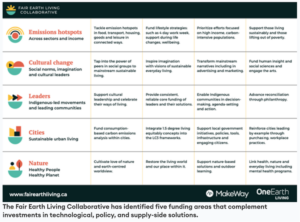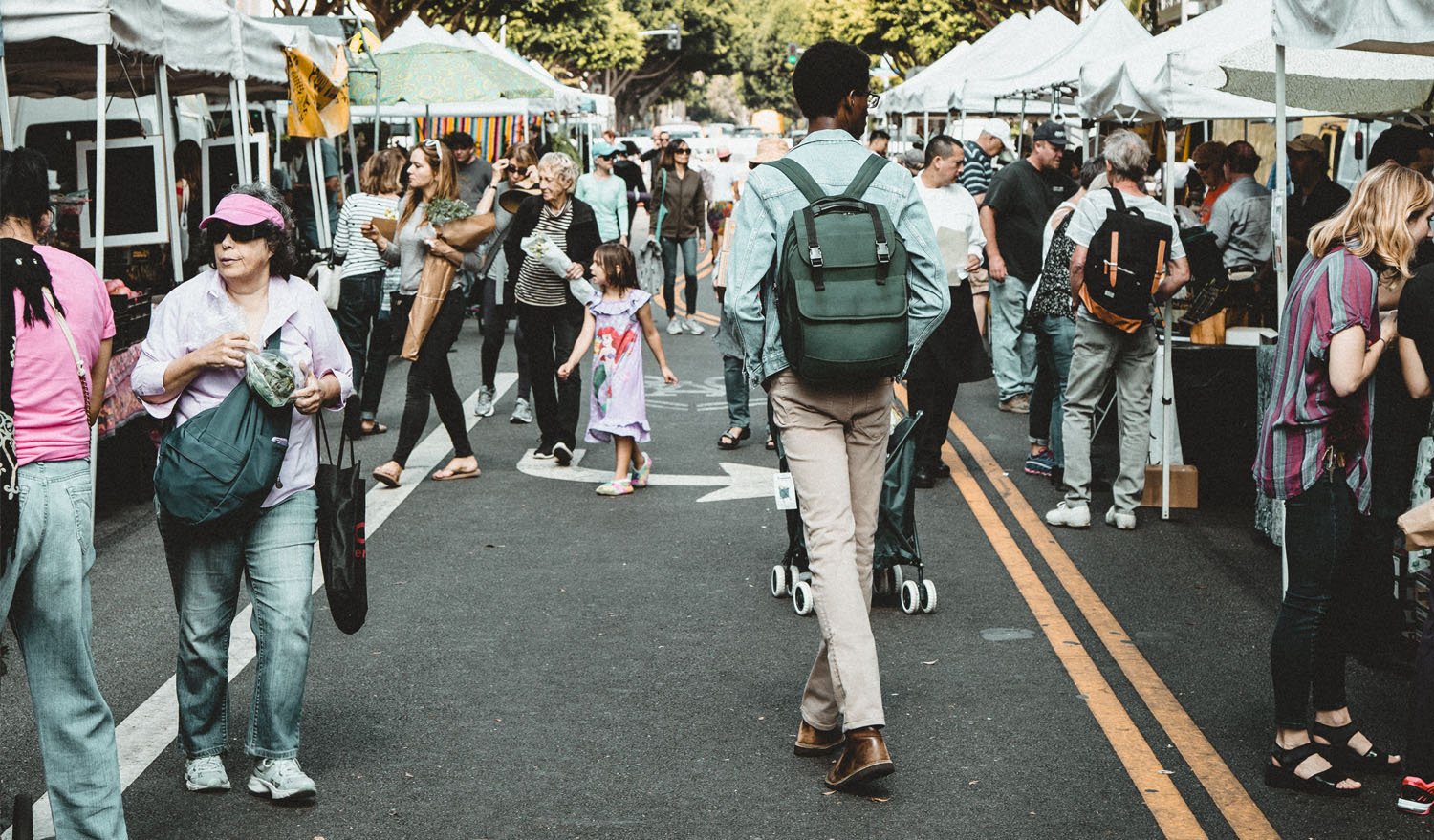Written by OneEarth Living and MakeWay.
Across this country, big changes are being made to restore nature and accelerate climate action. These include policy reforms around land-use or to advance the energy transition as well as technological advances like electric vehicles and heat pumps. They are what are known as the “supply side” solutions for climate action. These are essential, but also alienating for a lot of people. So how can we make solutions real for those who might not be thinking about climate or nature? What if we advanced ways of living that address affordability, inequality, and isolation, while also taking care of the planet? What that looks like is better ways to organize our cities; our choices around food, transport, goods, leisure and housing; and how we prioritize what actually makes us happy.
To advance key goals around nature, climate, and justice, it’s critical to engage with culture, lifestyle and behaviour change solutions. This is the promising “demand side” of climate action. It’s about shifting our cultural focus from buying and owning the next best thing, towards the beauty of parks, lakes, forests and all living things, relationships and health; place and belonging; joy and more free time.
Based on this vision, the Fair Earth Living Funder Collaborative launched in 2021. The Collaborative is a learning community of funders aimed at resourcing this promising field. It is co-hosted by MakeWay as a 2022-2025 strategic priority, and by OneEarth Living, a Canadian nonprofit focused on sustainable everyday living around the world. We received invaluable advice from Indigenous leaders at Turtle Island Institute and our international colleagues at Hot or Cool Institute. Together, we identified five priority funding areas.

The Fair Earth Living digital resource advances thought leadership in this area. Over three years, the Collaborative engaged more than 80 funders and regularly brought together 20+ funders through 10 online sessions as well as in-person events at the GLOBE Summit, the Zero Waste Conference, and Environment Funders of Canada. We explored the leadership of Indigenous communities, how cities support sustainable living, how youth movements are leading joy-filled climate action, and how Finland achieved deep emission reductions by engaging 40% of its population in behaviour changes. In 2023, Fair Earth Living hosted a 70-participant workshop at GLOBExCHANGE on how to support low-carbon living during big life changes like starting university or retiring.
The momentum is already underway. Here are just a few examples which clearly demonstrate the diversity of Fair Earth Living initiatives:
-
Northern Manitoba Food, Culture and Community Collaborative is supporting community-led solutions for strengthening food systems, culture, wellness, education and local economies.
-
Recyc-Québec is applying insights from a study on Motivations for Lighter Living to engage businesses, cities and citizens to mainstream sustainable living.
-
Shift: Action for Pension Wealth and Planet Health – a project of the MakeWay platform – is helping Canadians invest their money in a low-carbon future.
-
Not Far From The Tree is distributing fruit harvested from urban trees to households, volunteers and low-income Torontonians.
-
Fossil Fuel Ads Make Us Sick is a campaign by half a million physicians to stop fossil fuel advertising in Canada.
-
The Live Net Zero campaign from Canadian Geographic is engaging families to reduce their household emissions by 40% on average, reaching millions with their stories.
-
BCIT EcoCity Peer Network and Low-Carbon Cities Canada is supporting cities to address consumption-based emissions and enable sustainable living for their residents.
-
SCALE / LeSAUT is a network of artists, cultural practitioners and arts organizations addressing the climate emergency and environmental injustice.
We’ve learned over the years that Fair Earth Living isn’t about doing more – but about being better humans so that we can lay the foundations for systemic change. This echoes Indigenous understanding that the key to addressing the climate crisis is reconnecting with land by working in solidarity with nature and each other.
The potential is significant: the Intergovernmental Panel on Climate Change emphasizes that changing our lifestyles and behaviours can lead to a phenomenal 70% reduction in greenhouse gas emissions by 2050 with the right support. This is a key area for climate action, given that Canadians have some of the largest per capita footprints on Earth.
Fair Earth Living requires shifting cultures and behaviours in ways that lead not only to climate action, but to a world where both nature and people thrive. It shifts our focus from ‘human doings’ – prioritizing tasks, end goals and material consumption – to ‘human beings’ – valuing our relationships, interconnectedness to nature, being part of a caring community, and finding meaning in the journey of life.
This isn’t about placing the burden on individuals, but creating the necessary conditions for sustainable living to be the default and supporting solutions that people and communities are already advancing. It’s about ensuring that sustainable living action is accessible and affordable. Engaging everyday Canadians also builds the groundswell of support for bold government, business and community climate action. Looking ahead, we are committed to supporting transformations in how we live, move, eat and consume – and to developing systems solutions that create the context for sustainable living to be both possible and desirable.
For more on the Fair Earth Living initiative, see our vision for climate action.
Read a moving personal reflection on the importance of the Fair Earth Living approach by Kate O’Connor, a summer student at MakeWay in 2022.
If you are a funder curious about supporting more sustainable and equitable living, please contact MakeWay and OneEarth Living to learn how you can get involved and embrace Fair Earth Living.
